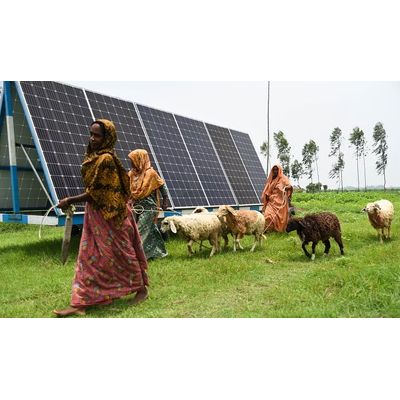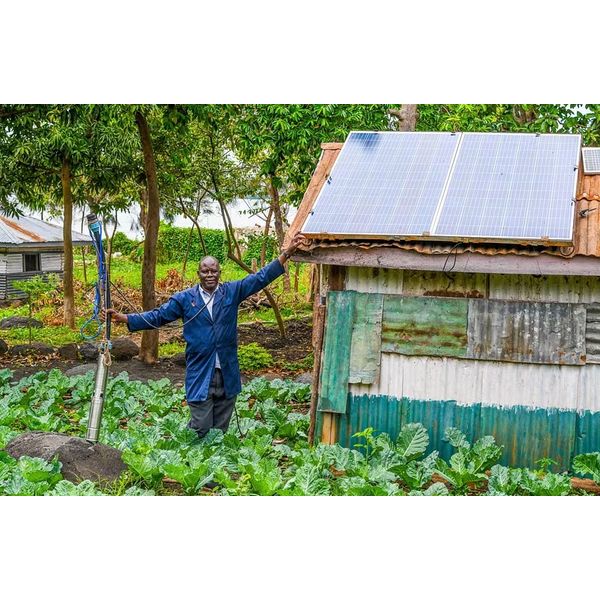

- Home
- Companies
- International Water Management ...
- News
- Solarizing will make agriculture ...

Solarizing will make agriculture resilient in South Asia and East Africa
The International Water Management Institute (IWMI) has launched the second phase of the Solar Energy for Agricultural Resilience (SoLAR) project. Running from July 2025 until December 2029 and supported by the Swiss Agency for Development and Cooperation (SDC), the project expands its geographical and thematic scope to deepen climate resilience and agricultural transformation of small holder agriculture through solar energy.
Building on the successful implementation of and lessons learnt from the first phase (December 2019 to May 2024) across Bangladesh, India, Nepal and Pakistan, the second phase extends the project’s reach to Ethiopia and Kenya and further scale interventions in Bangladesh and India. This South-South collaboration aims to position solar-powered agricultural systems as a replicable and scalable model for achieving sustainable, socially inclusive and climate-resilient agriculture across the Global South.
The first phase of SoLAR focused on generating robust empirical evidence, piloting innovative financing but also technical and business models and influencing policy design for solar irrigation in South Asia. The project demonstrated that solar-powered irrigation pumps help mitigate climate impacts by replacing diesel use, while ensuring access to stable irrigation while guarding against unsustainable groundwater withdrawal.
Darshini Ravindranath, project lead of SoLAR and Research Group Leader – Climate Policies, Finance and Processes (CPFP) at IWMI, emphasized how country-level engagement has turned evidence into meaningful action. She said, “Across the four south Asian countries, we have seen promising steps toward scaling solar irrigation sustainably and inclusively.”
In India, IWMI’s research findings have been shared with the Ministry of New and Renewable Energy (MNRE) to support evidence-based implementation. In Bangladesh, pilots supported by SoLAR informed Infrastructure Development Company Limited (IDCOL)’s approval of 56 new solar irrigation pumps, with 39 of these planned for grid connection — a significant step toward energy integration. In Nepal, the Alternative Energy Promotion Center (AEPC) is revising its subsidy disbursement criteria to better support women and smallholder farmers. IWMI also established the country’s first grid-connected solar irrigation pilot through a net-metering agreement. In Pakistan, IWMI developed web-based tools to map suitability for solar-uptake and a solar pump sizing module — now being scaled to three provinces, supporting government plans for scaling solar.
The project’s key impacts so far include: the promotion of gender-sensitive policies and business models that ensure equitable access to solar irrigation pumps (SIPs) for women farmers and marginalized groups through micro-SIPs and targeted training programs. Innovative financing approaches, such as micro-financing, grant-based investments and First Loan Default Guarantee schemes, have helped reduce financial barriers for smallholder farmers. By advocating for solar-powered irrigation to replace diesel systems, the initiative has supported more sustainable, climate-resilient agriculture and contributed to reduced carbon dioxide emissions, groundwater conservation and the adoption of high-value crops through region-specific strategies. The project also explored grid-connected solar irrigation, including net metering and surplus electricity sales, which not only provide farmers with an additional income stream but also promote responsible groundwater use. Training programs, field visits and collaborative learning has enhanced technical skills of small holder farmers and ensured that the adoption of SIPs is sustainable on the long term.
The second phase will expand these learnings to catalyze inclusive solar transitions in agriculture across both South Asia and East Africa. With a sharper focus on policy design, financing innovations, capacity development and living labs for real-world innovation, this phase aims to create an enabling environment for a widespread adoption of solar irrigation solutions.
Muluken Elias Adamseged, Deputy Country Representative at IWMI in Ethiopia, highlighted that East Africa’s agriculture faces climate and energy challenges, but that abundant solar resources offer a transformative solution. He said, “IWMI’s work in Kenya and Ethiopia highlights how scaling solar-powered irrigation, cooling and processing can boost year-round production, cut losses and costs, and enhance food security. By addressing policy, financing and capacity gaps, the project empowers farmers and agri-businesses to adopt solar solutions that raise incomes and reduce emissions.” He added, “Strategic partnerships will help drive a solar-powered agricultural transformation across the region.”

In the next four and half years, SoLAR’s integrated strategy evolves around four interconnected results: 1) evidence-based policy design is to inform national and regional solar irrigation policies with real-time research and data; 2. accelerated innovative funding instruments will expand farmers’ access to solar energy technologies; 3. the capacity of farmers, institutions and service providers will be built to enable sustained adoption; and 4. through so-called Living Labs community-led solar solutions will be tested, refined and replicated in diverse agro-ecological and socio-political settings.
“The program will directly benefit the vulnerable small holder farming families and country governments in India, Bangladesh, Kenya, and Ethiopia by improving energy and water security, reducing agriculture-related emissions, and enhancing adaptive capacity to climate risks,” said Philippe Sas, Head of Cooperation for SDC in India.
